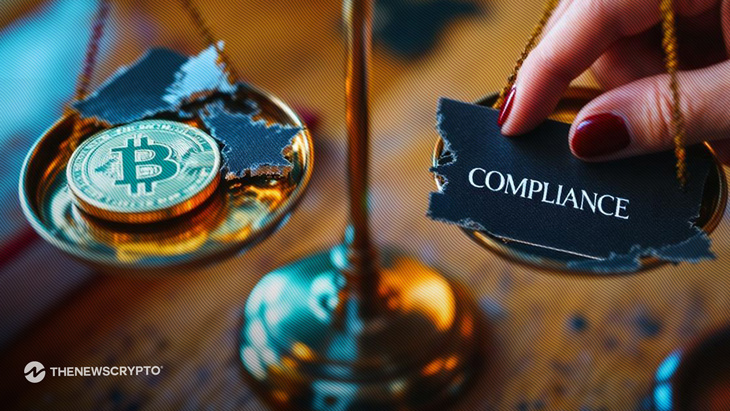- Legal action is prompting crypto platforms to strengthen internal controls and reassess their operational frameworks.
- Ongoing legal battles are redefining how exchanges approach risk, regulation, and user trust.
Regulators around the world are paying closer attention to the fast-evolving crypto industry—a space known for its constant innovation and decentralized nature. At the same time, several major court rulings in recent years have begun to reshape how the sector is viewed and handled legally.
These legal actions and shifts are already affecting how investors engage with the market and may even influence how crypto businesses plan their future. As the foundations for long-term regulation begin to take shape, it’s worth exploring the key legal developments and what they might indicate for the future of digital assets.
Major Legal Actions Reshaping the Crypto Industry
SEC vs. Binance and Changpeng Zhao:
One of the most significant legal confrontations in crypto history, in June 2023, the U.S. Securities and Exchange Commission (SEC) brought forward 13 charges against Binance and its founder, Changpeng Zhao, also known as CZ. The allegations included running unregistered securities exchanges and enabling unlawful fund transfers.
Notably, in November 2023, Binance admitted guilt to breaching anti-money laundering and sanctions regulations. The case concluded with the exchange agreeing to pay a record-breaking $4.3 billion fine. Furthermore, Binance founder Changpeng Zhao (CZ) was personally fined $50 million.
SEC vs. Coinbase:
The U.S. Securities and Exchange Commission faced a setback after its case against Coinbase was dismissed in February 2025. The agency had accused Coinbase, one of the country’s biggest cryptocurrency exchanges, of running an unregistered trading platform. And also offering staking services that the SEC believed should be classified as securities. Also, this reflects a shift in the regulatory approach toward the crypto space.
SEC vs. Ripple Labs (XRP)
The SEC first took Ripple to court back in December 2020, claiming that the company’s sale of XRP was essentially an unregistered securities offering. What followed was a long, closely watched legal action that kept much of the crypto world on edge. Fast forward to March 2025, and the SEC dropped the case entirely. Ripple agreed to a $50 million settlement, while $75 million was returned — a move that sparked a jump in XRP’s price and gave more weight to the argument that not every token should be treated as a security.
Other Enforcement Actions
As part of the Jump Trading settlement in manipulating TerraUSD (UST), Tai Mo Shan agreed to pay $73,452,756 in disgorgement, $12,916,153 in prejudgment interest, and a $36,726,378 civil penalty. Without admitting or denying the SEC’s findings, Shan agreed to cease violations of the registration and fraud provisions it had violated.
MetaMask was cleared by the SEC, which ended an investigation after determining the wallet did not break securities laws. This follows a period of scrutiny in which the SEC looked into whether MetaMask, created by Consensys, operated as an unregistered broker by helping trade certain digital assets.
NFT creators had sued the Securities and Exchange Commission to get a court ruling that their digital artworks, particularly those with potential for resale or appreciation, are not securities. The SEC contends that it is not subject to these lawsuits.
Global Developments
Outside the U.S., global regulators are moving forward with broad crypto rules:
The European Union’s Markets in Crypto-Assets (MiCA) regulation fully came into force in December 2024. It provides defined rules for crypto-asset issuers, service providers, and investors across the European Economic Area (EEA). The regulation is designed to tackle risks like financial instability, fraud, and market abuse, while also promoting innovation and building a secure, transparent crypto environment.
In addition, the UK Financial Conduct Authority (FCA) is moving to reverse a retail ban on crypto-linked exchange-traded notes (ETN). Exchange-traded notes (ETNs) are a kind of debt security that tracks the value of specific assets, including cryptocurrencies. Essentially, they offer investors a way to get exposure to digital assets while trading on a regulated exchange.
Impact on the Crypto Industry
Compliance and Risk Management:
Ongoing legal actions have pushed crypto exchanges to take a closer look at how their internal systems operate. As a result, legal experts are no longer just advisors—they’re now playing a key role in shaping business strategy alongside compliance teams.
Market Reaction and Investor Sentiment:
While Binance’s legal troubles caused short-term volatility in the market, they also sparked more serious conversations across the crypto space about the need for greater transparency. Ripple’s court win wasn’t complete, yet the result was enough to help rebuild the confidence of investors and give altcoins the necessary push. With Coinbase’s case now thrown out, there is growing optimism that regulators are finally shifting toward a more adaptable stance.
Legislative and Judicial Precedents:
Judges are defining the rules. The Ripple case made clear what is considered a security, while the Binance ruling showed that anti-money laundering laws apply, even to offshore firms.
Historical Context and Evolution
From 2020 to 2023, regulatory responses were uneven, typically reacting to incidents like ICO scams or exchange collapses. Moreover, in 2024, enforcement became more direct and targeted. By 2025, with certain lawsuits being dismissed and new laws emerging, the trend is moving toward clearer and more organized regulation.
The Road Ahead: What Comes Next?
Legislative Momentum in the US: Three major bills are currently under debate:
FIT21: In May 2024, the U.S. House of Representatives approved the Financial Innovation and Technology for the 21st Century Act (FIT21). Backed by bipartisan support, the bill aims to establish a clear and unified regulatory structure for digital assets. One of its key goals is to clearly define the responsibilities of the Securities and Exchange Commission (SEC) and the Commodity Futures Trading Commission (CFTC) when it comes to overseeing the crypto space.
It sorts digital assets and allocates regulatory tasks accordingly. This aims to protect consumers, ensure market integrity, and promote innovation in the digital asset space.
CLARITY Act: The bill, titled the Digital Asset Market Clarity (CLARITY) Act, aims to remove the longstanding ambiguity related to digital assets oversight by clarifying the roles of both the United States Securities and Exchange Commission (SEC) and the Commodity Futures Trading Commission (CFTC).
GENIUS Act: The law lays out specific guidelines on who is allowed to issue stablecoins and what standards they must meet for backing those coins. Its goal is to improve the safety and reliability of stablecoins, while also ensuring greater openness by making issuers share details about their reserves and business practices.
Institutional Entry
Clear rules are likely to bring institutional investors back into crypto. Firms like BlackRock, Fidelity, and other asset managers are already looking into ETF offerings. A stable legal setting could make the space even more accessible.
International Harmonization
A worldwide consensus on regulating stablecoins and centralized exchanges appears to be gaining likelihood. By following these guidelines, a more secure and reliable global marketplace can be promoted.
A Shift in Regulatory Approach
We might soon see regulators move their attention away from innovation and put more effort into tackling obvious issues like money laundering, market manipulation, and fraud. In doing so, this could actually help the crypto space grow stronger and build more trust, simply by narrowing what they focus on.
If crypto is going to thrive long-term, strong laws and clear legal frameworks aren’t just helpful—they’re essential. Without them, it’s hard to build trust. While it’s important to crack down on scams and misuse, regulators also need to avoid choking out innovation. Striking that balance can make a region far more attractive to real builders and investors who are in it for the long haul.
Clear and thoughtful regulations can help crypto get closer to mainstream use. It’s not just about rules — they make things safer for users and also help countries find more common ground in how they handle digital assets.
If the crypto sector continues adopting smart regulations, pushes for better global alignment, and backs thoughtful governance, there’s a real shot at it becoming more trusted and stable in the long run. Over time, it could even earn a solid place in the mainstream financial system.







